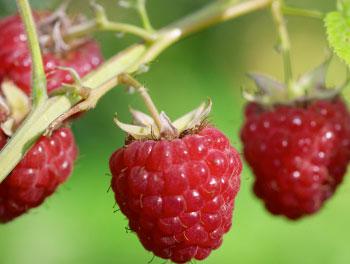Red raspberry
From Wikiwel
See also : Black raspberry
Other Names: Framboise, Framboise Rouge, Framboisier Rouge, Framboisier Sauvage, Frambuesa Roja, Raspberry, Rubi Idaei Folium, Rubus, Rubus buschii, Rubus idaeus, Rubus strigosus, Framboos, Himbeere, Framboesa, frambuesoRed raspberry is a plant that is the source of a widely eaten, tasty, sweet berry. However, red raspberry fruit and leaf have also been used as medicine for centuries. The therapeutic use of raspberry leaf was first described in 1597 in a book called “The Herbal,” or “A General History of Plants.” Today, red raspberry leaf and fruit are still used as medicine.
Special Precautions of Red raspberries
- It’s LIKELY SAFE to eat red raspberry in food amounts during pregnancy. Red raspberry leaf is POSSIBLY SAFE for use in medicinal amounts during late pregnancy, but only under the direct supervision of a healthcare provider. Red raspberry leaf is commonly used by nurse midwives to ease delivery. Don’t take it on your own. The concern is that red raspberry might act like the hormone estrogen, and this might harm the pregnancy.
- Not enough is known about the safety of taking red raspberry during breast-feeding. It’s best to stay on the safe side and avoid use.
- Hormone-sensitive conditions such as breast cancer, uterine cancer, ovarian cancer, endometriosis , or uterine fibroids: Red raspberry might act like estrogen. If you have any condition that might be made worse by exposure to estrogen, don’t use red raspberry.
- The most common adverse effects appear to be due to contaminated fruit, resulting in digestive upset, diarrhea, vomiting and fever.
- There's some concern that red raspberry leaf might be harmful to people with liver or kidney disease.
The benefits of Red raspberries are
- Stomach problems.
- Heart problems : red raspberry leaf is purported to improve heart health and aid in the prevention of heart disease.
- Respiratory system problems.
- Diabetes.
- Vitamin deficiencies.
- Fluid retention.
- Sore throat : When applied topically (i.e., directly to the skin), red raspberry leaf is thought to soothe sore throat and promote wound healing.
- Skin rash.
- Preventing Cancer : Good source of Cyanidin. Red raspberry leaf shows promise in the protection against some forms of cancer, according to a preliminary study published in the Journal of Medicinal Food in 2012. In tests on human cells, scientists observed that antioxidants found in red raspberry leaf extract may help knock out cells causing colon cancer and cancer of the larynx.
- Source of Delphinidin, a potential cancer fighter. Delphinidin is confirmed to be a cancer stem cell killer. Cancer stem cells are largely responsible for the failure of conventional cancer treatment.
- Source of Ellagic Acid.
- Pregnancy : Popular among midwives, red raspberry leaf is also used to facilitate labor and delivery, as well as to prevent miscarriage. When taken during pregnancy, red raspberry leaf is said to protect against pregnancy-related complications (such as preeclampsia and preterm labor) and help shorten the duration of labor. However, research on the use of red raspberry leaf during pregnancy has yielded mixed results.
